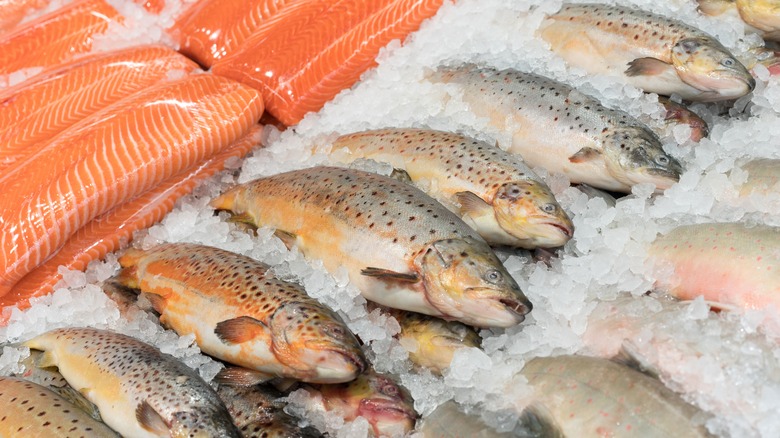Here's How Long Fish Stays Fresh In The Fridge
Sometimes you come home with a beautiful fish, but something prevents you from preparing your whole roasted branzino that evening. Fish is best cooked as quickly as possible, but how long do you really have before it goes bad? If kept in the refrigerator, raw fish will be at its absolute best within 24 hours of purchasing. If you are preparing a dish that requires raw or nearly raw fish — such as mixed seafood ceviche — don't store it for longer than this. However, if you plan to cook it, it will still be safe to eat for up to two days.
If you're storing leftover cooked fish, you have more time. Provided you cooked a fresh piece of seafood to begin with, it will stay fresh for three to four days. On the other hand, if you have leftovers from a restaurant, it's best to consume them within 24 hours, because you can't be sure how fresh the fish was before it was cooked.
These timelines depend on your refrigerator maintaining a temperature of less than 40 degrees Fahrenheit. Food must be kept below this temperature to slow the spread of harmful bacteria. If you're concerned that your fridge might be running hotter than this, leave a glass of water inside it for 24 hours, and use a meat thermometer to check the liquid's temperature.
Storing your fish for maximum freshness
In restaurants, fish and meat are pretty much always kept at the bottom of the refrigerator or walk-in to avoid cross-contamination, the process by which harmful bacteria are transferred from one ingredient to another. If you place your fish on the top shelf of your refrigerator and it leaks onto some exposed arugula below, for example, your greens will be contaminated.
To maximize the freshness of your fish without fully freezing it, you can keep it on ice. However, to avoid a common food storage mistake, do not let the fish directly touch the ice. Bacteria that spoil fish thrive in moist environments, so keep things as dry as possible. Clean and carefully dry your fish, place it in a resealable bag, and then lay ice packs or bagged ice on top of it in your fridge. While this will not extend its shelf life beyond two days, it will ensure the seafood tastes its best.
You can also freeze your fish. It will remain safe in your freezer indefinitely, but for optimal taste and texture, it is best consumed within three to eight months. Ensure to place your protein in an airtight container or a vacuum-sealed bag, as exposure to air causes freezer burn to develop.
How to tell if your fish has spoiled
You should always ensure that your fish is still fresh, even if it hasn't been in your fridge for more than two days. Smell is a crucial factor here. While fresh fish has an odor, it should smell clean and oceanic. If you detect a pungent or sour scent, or if your seafood smells like ammonia, it is likely past its prime.
There are plenty of signs based on the appearance of the fish, too. If you're dealing with a whole specimen, examine its eyes. They should be moist and clear, not sunken or cloudy. For a fillet, check for any discoloration in the flesh. Any signs of grayness indicate that it should not be consumed. Similarly, fresh fish should have firm, moist flesh; if the meat is bruised or slimy, it should not be eaten. You can also press down on a fillet to test its freshness. If it doesn't bounce back quickly, this is another indicator that the fish has gone bad.



